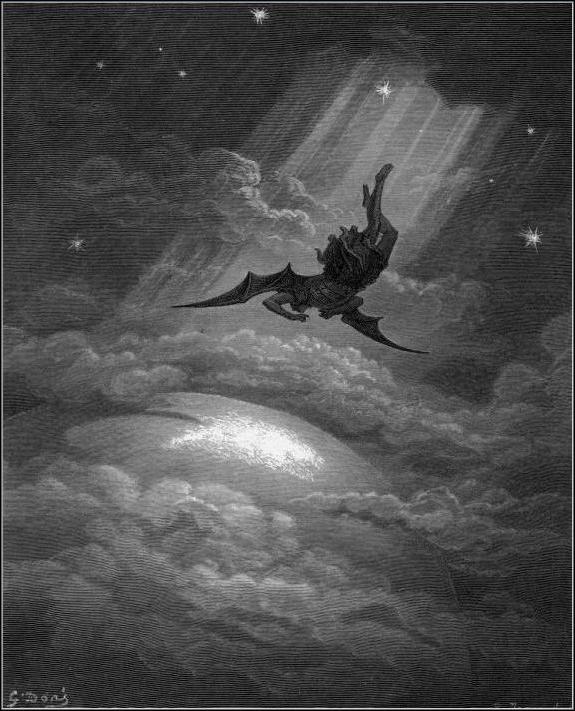What does the Bible have to say about Lucifer?

Isaiah 14:12-15
“How you are fallen from heaven, O Day Star, son of Dawn! How you are cut down to the ground, you who laid the nations low! You said in your heart, ‘I will ascend to heaven; above the stars of God I will set my throne on high; I will sit on the mount of assembly in the far reaches of the north; I will ascend above the heights of the clouds; I will make myself like the Most High.’ But you are brought down to Sheol, to the far reaches of the pit. (1)
above the stars of God (El/Saturn?)
what / where is Sheol ?
She’ol (/ˈʃiːoʊl/ shee-ohl or /ˈʃiːəl/ shee-əl; Hebrew שְׁאוֹל Šʾôl), translated as « grave », « pit », or « abode of the dead« , is the Old Testament/Hebrew Bible‘s underworld, a place of darkness to which all the dead go, both the righteous and the unrighteous, regardless of the moral choices made in life, a place of stillness and darkness cut off from God.[1]
The inhabitants of Sheol were the « shades » (rephaim), entities without personality or strength.[2] Under some circumstances they could be contacted by the living, as the Witch of Endor contacts the shade of Samuel for Saul, but such practices are forbidden (Deuteronomy 18:10).[3]While the Old Testament writings describe Sheol as the permanent place of the dead, in the Second Temple period (roughly 500 BCE-70 CE) a more diverse set of ideas developed: in some texts, Sheol is the home of both the righteous and the wicked, separated into respective compartments; in others, it was a place of punishment, meant for the wicked dead alone.[4] When the Hebrew scriptures were translated into Greek in ancient Alexandria around 200 BC the word « Hades » (the Greek underworld) was substituted for Sheol, and this is reflected in the New Testament where Hades is both the underworld of the dead and the personification of the evil it represents.[5] (2)
Hades (/ˈheɪdiːz/; from Ancient Greek Ἅιδης/ᾍδης, Hāidēs; Doric Ἀΐδας Aidas) was the ancient Greek god of the underworld. Eventually, the god’s name came to designate the abode of the dead. In Greek mythology, Hades is the oldest male child of Cronus and Rhea considering the order of birth from the mother, or the youngest, considering the regurgitation by the father. The latter view is attested in Poseidon‘s speech in the Iliad.[1] According to myth, he and his brothersZeus and Poseidon defeated the Titans and claimed rulership over the cosmos, ruling the underworld, air, and sea, respectively; the solid earth, long the province of Gaia, was available to all three concurrently.
Later the Greeks started referring to the god as Plouton (see below), which the Romans Latinized as Pluto.[2] The Romans would associate Hades/Pluto with their own chthonic gods, Dis Pater and Orcus. The corresponding Etruscan god wasAita. He is often pictured with the three-headed dog Cerberus. In the later mythological tradition, though not in antiquity, he is associated with the Helm of Darkness and the bident. The term hades in Christian theology (and in New Testament Greek) is parallel to Hebrew sheol (שאול, « grave, dirt-pit »), and refers to the abode of the dead. The Christian concept of hell is more akin to and communicated by the Greek concept of Tartarus, a deep, gloomy part of hades used as a dungeon of torment and suffering. (3)
Revelation 12:7-9
Now war arose in heaven, Michael and his angels fighting against the dragon. And the dragon and his angels fought back, but he was defeated, and there was no longer any place for them in heaven. And the great dragon was thrown down, that ancient serpent, who is called the devil and Satan, the deceiver of the whole world—he was thrown down to the earth, and his angels were thrown down with him.
Accordingly to Velikovsky ideas, Michael is the planet Venus, as archangel Gabriel is the planet Mars. (citation needed)
Angel
Etymology
The word angel in English is a fusion of the Old English/Germanic word engel (with a hard g) and the Old French angele. Both derive from the Latin angelus which in turn is the romanization of the ancient Greek ἄγγελος (ángelos[5]), « messenger », « envoy »,[6] which is related to the Greek verb ἀγγέλλω (angéllō), meaning « bear a message, announce, bring news of » etc.[7] (4)
Judaism
The Bible uses the terms מלאך אלהים (mal’āk̠ ’ĕlōhîm; messenger of God), מלאך יהוה (mal’āk̠ YHWH; messenger of the Lord), בני אלהים (bənē Elohim ’ĕlōhîm; sons of God) and הקודשים (haqqôd̠əšîm; the holy ones) to refer to beings traditionally interpreted as angels. Later texts use other terms, such as העליונים (hā‘elyônîm; the upper ones). (4)
And no wonder, for even Satan disguises himself as an angel of light.
Luke 10:18
And he said to them, “I saw Satan fall like lightning from heaven.
Ezekiel 28:14
You were an anointed guardian cherub. I placed you; you were on the holy mountain of God; in the midst of the stones of fire you walked.

Holy Mountain of God
For if God did not spare angels when they sinned, but cast them into hell and committed them to chains of gloomy darkness to be kept until the judgment;
Ezekiel 28:16
In the abundance of your trade you were filled with violence in your midst, and you sinned; so I cast you as a profane thing from the mountain of God, and I destroyed you, O guardian cherub, from the midst of the stones of fire.
Wonder if sinned has something to with the Babylonian moon God, Sin.
1. http://www.openbible.info/topics/lucifer
2. http://en.wikipedia.org/wiki/Sheol
3. http://en.wikipedia.org/wiki/Hades
4. http://en.wikipedia.org/wiki/Angels
